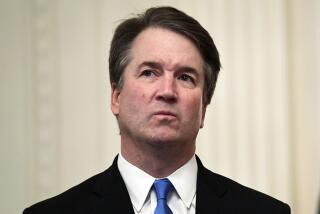Appeals Court Backs New Federal Trial for Keating
- Share via
In yet another victory for Charles H. Keating Jr., appellate judges agreed Tuesday that the former Lincoln Savings boss and his son are entitled to a new federal trial on charges of looting the thrift and swindling investors.
In a 3-0 vote upholding the trial judge, the U.S. 9th Circuit Court of Appeals said federal jurors improperly learned of and discussed Keating’s earlier state court conviction on similar charges.
U.S. District Judge Mariana Pfaelzer, hearing the federal trial, had ruled jurors would be too inclined to find the Keatings guilty if they knew about the prior state conviction.
“The probability that one or more jurors reached a verdict based in part on the extrinsic evidence is unacceptably high,” said the opinion by 9th Circuit Judge Charles Wiggins.
The ruling leaves all Keating criminal cases in limbo nine years after regulators seized his Irvine-based thrift, 6 1/2 years after a state jury found him guilty and 5 1/2 years after his federal conviction.
His state securities fraud conviction was tossed out in April 1996 by a federal judge who cited flawed legal theories and jury instructions. State prosecutors are appealing that ruling.
Federal prosecutors in Los Angeles, stymied so far, will consult with superiors in Washington before deciding whether to appeal the case further, said Miriam A. Krinsky, chief of criminal appeals at the U.S. attorney’s office in Los Angeles. That decision must be made by July 24.
Keating’s lawyer, Stephen C. Neal, praised the appeals court ruling and urged prosecutors to “give up” on pursuing Keating, 74, who already has spent 4 1/2 years behind bars.
“It’s one of their options, and it’s what they should do,” Neal said.
Keating, a land developer, purchased Lincoln Savings through his Phoenix-based American Continental Corp. in 1984. His speculative investments, political influence, love of luxury and battles with regulators eventually made him the central symbol of the 1980s S&L; debacle.
The collapse of his empire in 1989 rendered worthless $250 million in uninsured American Continental bonds, many of which had been sold to elderly Lincoln Savings investors who previously had bought government-insured CDs.
Keating has been free since October 1996, except for five days spent in jail this March and April after Pfaelzer ruled he had violated the terms of his release by applying for a passport.
After Keating and his son, Charles Keating III, were convicted in federal court, his lawyers obtained statements from jurors and alternates saying the state convictions were known to some of the panel and were discussed in the jury room.
Pfaelzer ruled that the information denied Keating a fair trial, a conclusion the appeals court endorsed.
“At least one juror learned of and several jurors discussed the state conviction during Keating’s federal trial,” the appeals panel wrote. “In effect, those jurors who communicated the information testified against Keating in violation of his Sixth Amendment rights” to confront his accusers.
If they decide to appeal the ruling by the three-judge panel, federal prosecutors could take their case to the full 9th Circuit Court or directly to the U.S. Supreme Court.
More to Read
Inside the business of entertainment
The Wide Shot brings you news, analysis and insights on everything from streaming wars to production — and what it all means for the future.
You may occasionally receive promotional content from the Los Angeles Times.











